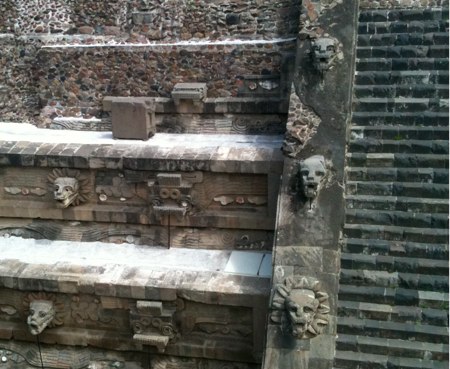1st International Congress On Web Studies
Today was the wrap-up day for the First International Congress on Web Studies, hosted by the Tecnológico de Monterrey and capably chaired by Prof. Everardo Reyes-Garcia. This was an intriguing conference of unexpected design; if the Future Of Digital Studies had its feet planted firmly in the literary, this congress on Web Studies was centered in the art world and heavily flavored by its intriguing exhibition. And if the Florida conference was largely American in flavor, this event had very strong ties to the active (but often separate) Francophone hypertext world.
Robert Logan opened the proceedings with a nice review of McLuhan’s approach to new media. He believes that reading on the screen differs deeply and inherently from reading in print, to the extent of primarily involving an entirely opposite hemisphere. I find this surprising, to say the least, and I think the result must be mistaken: if we were reading something like the iPad and the screen very gradually switched from transmissive to reflective, would our underlying neural process need to switch entirely at some point in the process? Nonetheless, the hypothesis is driving him to investigate new hybrid eBooks with rich multimedia, and with so many trivial demos circulating these days it will be nice to see more real work.
I opened the second day with a big setpiece review of hypertext narrative, gluing together strands of “Where Are The Hypertexts?”, “NeoVictorian Computing,” “On Hypertext Narrative”, “Everyone’s Everyday Knowledge Work”, and “On Criticism”. It’s a brisk talk, especially since my odd speaking patterns are especially challenging for some for whom English is a second or third language. I was surprised to find serious resistance to my NeoVictorian argument from some of the artists, who seem to prefer a gift economy with vehemence that surprised me.
Imad Saleh, who now directs Laboratoire Paragraphe at Université Paris 8, gave a fine overview of his laboratory’s research and, indeed, of the state of hypertext and the Web. He has a lot more faith in semantic Web technologies, especially RDF and OWL, than I’ve been able to muster lately; it’s good to revisit.

Prof. Garcia arranged a post-conference trip to Teotihuacan, which was wonderful. I think these followup events are too easily dismissed as junketing, and serve some very important purposes. First, it’s very good to mix attendees and speakers, especially in a medium-sized conference where students might not be able to meet all the people they’d like to see. Second, long walks and informal chats are a good way to work off any rough edges that might be left from conference drama, and they’re a great place to explore collaboration plans. And finally, it’s essential to effective conference-going to actually see the places you visit, and you don’t want to skip conference events to do this. I have a terrible sunburn and lots of unanswered questions – where are all the cooking pots and metates and hearths? – but it was lots of fun.